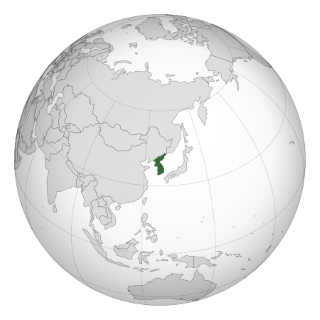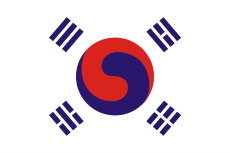Joseon
The Great Kingdom of Joseon 대 조선 왕국 | |
|---|---|
|
Flag | |
| Motto: Let the world benefit widely 널리 세상을 이롭게 하라 | |
 | |
| Capital and largest city | Seoul |
| Official languages | Korean |
| Recognised national languages | Korean, English |
| Ethnic groups (2023) | Koreanns (92%) Others (8%) |
| Demonym(s) | Korean(s), Joseonian(s) |
| Government | Constitutional Monarchy |
• Empress/Emperor | Lee Dam(Empress) |
• Prime Minister | Park Yohan |
| Legislature | National Assembly |
| Establishment | |
• Establishment of the Joseon Dynasty | 1392 |
• Establishment of the Imperial Government | 1861 |
• Enactment of a Democratic Constitution | 1921 |
| Population | |
• 2023 estimate | 240,000,000 |
• 2023 census | 245,421,525 |
| GDP (nominal) | 2023 estimate |
• Total | 21,951,562,520,000 $ |
• Per capita | 89,444 $ |
| HDI (1612 AR) | 0.935 very high |
| Currency | Won |
| Time zone | UTC + 8 |
| Date format | mm-dd-yyyy |
| Driving side | right |
| Calling code | +82 |
| ISO 3166 code | K.O.J. |
The Great Kingdom of Joseon, natively 대조선왕국 - is a constitutional monarchy nation located on the Korean Peninsula in East Asia. The official language is Korean, and the capital is Seoul. It has a population of about 240 million, of which 80 million live in the metropolitan area.
Joseon was founded in 1392 when King Taejo Lee Seong-Gye overthrew the Goryeo Dynasty and established a new dynasty. In 1920, Joseon changed its political system from despotism to constitutional monarchy and held its first general election in 1921.
Joseon began to grow steadily in the 19th century and became an advanced country in Asia. In the 1960s and 1980s, it experienced a period of rapid growth, and in 1982, nominal GDP exceeded $18 trillion.
Today, Joseon is considered a powerhouse in automobile manufacturing, semiconductor manufacturing, electronic equipment manufacturing, shipbuilding, and pharmaceutical manufacturing. Joseon is Asia's leading country in high-tech industries and has a huge impact on the global economy as the world's three largest economies.
History
Government
Society
Joseon is a country where 92% of the population is made up of only Korean descent. Therefore, the mainstream culture that dominates Joseon's culture and society is Korean culture, and most of the other ethnic groups are assimilated into Korean culture rather than maintaining their own culture.
Joseon is considered to have a high level of human rights overall, including women's rights. Women are free to get promoted without the so-called "glass ceiling" that prevents women from being promoted to society, and the socially disadvantaged, such as children and the elderly, are also free from abuse or poverty.
Also, Joseon has a small gap between rich and poor. Joseon's active welfare policies and redistribution of wealth through corporate taxes are evaluated to prevent excessive gaps between the rich and the poor from occurring and to increase the living standards of the economically vulnerable.
The education system of Joseon consists of 6 years of elementary school, 3 years of middle school, and 3 years of high school. Compulsory education is until high school, and the state pays for students' tuition and food during the compulsory education period. Elementary and middle schools adopt a system to complete courses designated by the Ministry of Education, but high schools adopt a credit system similar to universities.
Currently, there are a total of 513 universities in Joseon. Many of these are private universities, but there are at least two national universities in each region. Each province has one four-year national university and one education university, with an average of 30 universities in one province.
Joseon has 80 % of its population in cities that account for 27 % of its land area. This leads to high real estate prices in cities and suburbs. Since the real estate price problem is also linked to the quality of life of the people, the government has long intervened in the real estate market to prevent overheating but has not achieved much.
Joseon's public security is famous for being very stable. The incidence of misdemeanors, violent crimes, and the death toll from crime are all among the lowest in the world, and there is no social unrest from crime.
However, there is a controversy over privacy infringement because the ratio of CCTV to the population is high. There are 150 CCTVs per 1,000 people in Joseon, and it is estimated that there are more civilian CCTVs not included in the statistics. The high number of CCTVs increases the probability of crime being detected in advance, but at the same time, it causes personal privacy to be exposed to other people's eyes.
